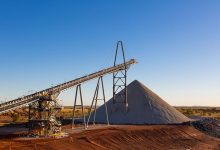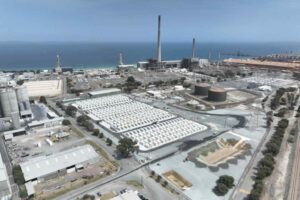Australia has a treasure trove of critical ores but nickel and lithium producers want tax relief to get it out of the ground and into the world’s electric cars.
Australia may be the world’s best quarry but significant government intervention may be needed to turn crucial energy transition minerals into long-term wealth.
Nickel and lithium producers warn the recent slump in prices they can get on world markets is crushing net-zero dreams, terminating more than 1000 jobs and mothballing projects.
The competitive advantage Australia has enjoyed in iron ore and coal is not the same for critical minerals, according to Deloitte Access Economics.
“More urgent progress is needed to ensure Australia has the right labour, infrastructure, regulations and key trade relationships to underpin the mining industry’s next phase of growth,” the forecaster said in its latest business outlook.
Operating costs are rising and nickel prices have rapidly halved, while local producers struggle to compete with Indonesia where labour costs and environmental standards are lower.
Meanwhile, the price of lithium has crashed more than 80 per cent since the peaks of 2022, despite euphoria about the rise of electric cars and consumer demand for a climate-friendly future.
China continues to have a stranglehold on the supply of battery-ready materials and the cash squeeze is putting Australia’s desired expansion into processing battery chemicals on the backburner.
After crisis talks with state and federal government ministers, BHP Nickel West boss Jessica Farrell said the “incredibly tough time” for the nickel industry was a “wake-up call” for Australia.
Relief from paying state royalties, federal tax incentives for investment, emergency cash injections and production tax credits are on the table.
Resources Minister Madeleine King committed to “accelerate” Treasury’s work on production tax credits and how they might be applied in the nickel industry and more widely across critical minerals sector.
“Nickel and lithium will be essential to the global ambitions to reach net-zero emissions,” Ms King said.
“When the playing field is fair, Australian resources stand a fair chance.”
Producers also want governments to bankroll adequate road, rail and energy infrastructure to get raw materials to processing and ports.
Pilbara Minerals CEO Dale Henderson said production tax credits and other supports would help the critical minerals sector, such as improved time frames for project approvals and government-supported loans and grants.
“These initiatives will better position Australia compete against other countries in the global race for market share in this emerging industry,” he said.
Luca Giacovazzi, CEO of nickel company Wyloo, said the nation needs to become a producer of finished products and not just raw materials, and also set the standard for sustainable battery minerals which would give Australia greater control over pricing.
“EVs made with dirty nickel are not a better choice for the environment, and we need better labelling standards that incentivise car manufacturers to do the right thing and buy clean metals,” he said.
“The production tax credit will drive more downstream processing in Australia, delivering a stronger economy and new jobs.”
While Ms King is working on emergency support, making the most of Australia’s superior credentials is on the long-term to-do list.
Nickel and lithium, along with cobalt mostly sourced from the Congo in Africa, are key ingredients in electric vehicle batteries.
Australian nickel and lithium may be produced to higher environmental, social and governance (ESG) standards but commodity markets do not pay a premium for ethical ores – yet.
“If the world is really serious about helping the planet, we need to ensure all materials we mine and manufacture are as green and clean as they can be,” Ms King said.
Future work with industry players will push trading platforms and electric vehicle manufacturers to better recognise and disclose ESG performance to consumers.
An Australian-United States task force is developing a shared energy industrial base, including common ESG standards for the sector to help break China’s stranglehold over supply.
Australia’s partnership with the European Union on sustainable critical and strategic minerals will also get a renewed push for a “green premium” to be paid by leading car makers and energy equipment firms who must trace the source of their materials.
Benchmark lithium analyst Cameron Perks told an industry webinar the market had enough supply for the next few years but was heading towards an increasingly large deficit, particularly for sustainably produced materials.
He said China would continue to dominate the downstream chemical supply, boosted by more raw material from Africa coming online.
“Buyers can once again make some choices, and the question of provenance becomes the most important question of them all,” he said.
Many electric car makers and so-called original equipment makers (OEMs), which operate on a massive scale making components for the big brands, are accountable for where they source their supplies.
“Those sourcing strategies, particularly for OEMs, they’re looking for industry leading, good-practice companies to fulfil their lithium requirements,” Dr Perks said.
Increasingly, car makers and suppliers must meet decarbonisation requirements for a company but also the country they’re operating in.
Wyloo’s Mr Giacovazzi said Australia needs to empower consumers to understand whether their electric vehicles are truly green, and hold car manufacturers accountable for buying low-carbon nickel.
He also wants assurances that Australia’s position as a supplier of low-carbon nickel to the US is locked in.
Indonesia, which has the world’s biggest nickel ore reserves, is pushing for a free trade deal so it can sell American car makers subsidised supplies.
Copper, also crucial for clean energy infrastructure, remains strong as global supply shocks have supported prices.
BHP’s acquisition of OZ Minerals in 2023 for its South Australian copper and WA nickel assets is expected to significantly increase SA’s copper output, according to federal forecasts.
A spokesman for SA Energy and Mining Minister Tom Koutsantonis said the price of copper was traditionally less prone to market fluctuations than minerals such as nickel and lithium.
“Market signals remain strong for copper in South Australia,” he said.
Deloitte Access Economics said the green energy transition is a key growth opportunity for Australia’s whole mining industry, but more urgency is required to capitalise on the export potential of rare earths and critical minerals.
“The window of opportunity may not be open as wide or as long as previously anticipated,” Deloitte said.
Source: AAP








